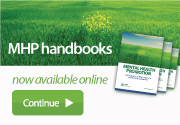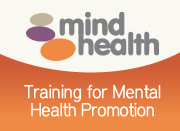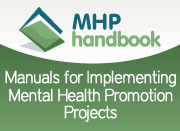Tools
- Utilities:
- Print this page
- Send this page
- Font size:
- Increase font size
- Decrease font size
Browse Database
Login, so as to add your own items.
-
STEP-BY-STEP GUIDE: How to Create and Coordinate a Contact the Elderly Group
26/05/2008
This tool outlines some guidelines on how to work in partnership to assist in starting a new Contact the Elderly group from scratch and how to organise it once it has been established. Settings: Residence for Older People
MHP Steps: Needs Analysis | Implementation | Preparation -
Psychological Services for Long Term Care Resource Guide
26/05/2008
This guide is a set of resources that captures the state of the art in psychological services to older adults and especially to those in long term care. These materials cover individual, family and organizational interventions as well as psychological and neuropsychological assessment of older adults in long term care. The problems encountered reflect the full range of symptomatic (DSM Axis I) and personality (DSM Axis II) areas including dementia diagnosis and management. This resource guide offers a series of books, book chapters and journal articles which collectively address this range of issues. Settings: Residence for Older People
MHP Steps: Needs Analysis -
Helping Older Adults Search for Health Information Online: A Toolkit for Trainers
26/05/2008
This is a resource for trainers - an Internet training program to help older adults find answers to their health questions. It's a free, downloadable Toolkit for Trainers that lets you accomplish two valuable goals -- introduce older adults to high-quality online health information (eg Health topics, drugs and supplements, the medical encyclopedia) and help them build Internet skills at the same time. The toolkit comes with a set of teaching materials that will work with beginning and intermediate students of the web, including easy-to-use lesson plans, student handouts, web searching exercises, illustrated glossaries and screen shots of web pages visited in class. Settings: Residence for Older People
MHP Steps: Implementation -
What Practitioners Shoud Know About Working with Older Adults
26/05/2008
This publication is designed to give psychologists and other health care providers important information to help guide their work with older adults. Settings: Residence for Older People
MHP Steps: Preparation -
Aging and Human Sexuality Resource Guide
26/05/2008
This website helps health professionals in training to find information to learn more about aging and sexuality, once they have realized how important this topic is to solve that problem. It contains a wealth of citations for empirical evidence on aging and sexuality, summary chapters, case presentations, and resources to use for education in teaching settings or with clients. It is our hope that it will serve to further openness and sensitivity in health care professionals, as they try to attend to a vitally important topic that does not lose its power with age. Settings: Residence for Older People
MHP Steps: Preparation -
Social Care Institute for Excellence: Ageism, Age Discriminatinon and Social Exclusion
26/05/2008
For people who work with older people, this tool asked you to consider issues which are central to understanding the experience of ageing and older age in contemporary society. Ageism, age discrimination and social exclusion diminish the quality of life which older people may enjoy. They also threaten their mental health. In spite of their negative effect on the daily lives of older people, however, ageism and age discrimination are often unrecognised, ignored, or even compounded in health and social care settings. And social exclusion has only recently been officially acknowledged as affecting older people as well as children and families. Settings: Residence for Older People
MHP Steps: Implementation | Preparation -
Youth Suicide Prevention School-Based Guide
26/05/2008
The Youth Suicide Prevention School-Based Guide is designed to provide accurate, user-friendly information. The Guide is not a program but a tool that provides a framework for schools to assess their existing or proposed suicide prevention efforts (through a series of checklists) and provides resources and information that school administrators can use to enhance or add to their existing program. Settings: Education -
Increasing Family Involvement for Special Populations
26/05/2008
This guide is part of the series 'Creating Environments that work for all Children: Real Manuals for Real Teachers'. Family involvement is a significant factor in improving educational outcomes. The family makes critical contributions to student achievementfrom the earliest childhood years through high school, and efforts toimprove children’s outcomes are much more effective when the family is actively involved. Settings: Education
MHP Steps: Implementation -
Positive Behaviour Support: A Classroom Wide Approach to Successful Student Achievement and Interactions
26/05/2008
As part of the series 'Creating Environments that work for all Children: Real Manuals for Real Teachers', the intention of this manual is to empower teachers to address student challenges through every day teacher-applied strategies. The foundation for these strategies is in curricular and instructional research situated in a problem-solving framework for behavior support. The framework, Positive Behavior Support (PBS), is a proactive approach proven successful in addressing challenging behavior within general and special education classroom settings and is most effective when implemented across home, school, and community environments Settings: Education
MHP Steps: Implementation -
Creating an Environment for Emotional and Social Well-Being
26/05/2008
“Creating an Environment for Emotional and Social Well-being: An Important Responsibility of a Health-Promoting and Child-Friendly School” focuses on the psycho-social environment of the school. This document and its Psycho-social Environment Profile are designed to help school personnel assess qualities of the school environment that support social and emotional well-being. It is intended to be a starting point, leading to awareness, discussion, and action by school personnel, students and parents. Settings: Education
MHP Steps: Needs Analysis



